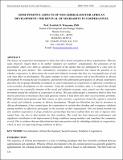Some positive aspects of neo-liberalism for African development: The revival of solidarity in co-operatives
Abstract/
The history of cooperative development in Africa has left a mixed conception of these organizations. Whereas
some observers regard them to be neither voluntary nor members’ organizations, but extensions of the
government; others view them as capitalist extensions of the market that are dominated by a class bent on
exploiting the poor farmers. This contradictory conception of cooperatives has raised the question as to
whether cooperatives in Africa foster the social and solidarity economy that they are conceptually part of and
with what effect on development. This paper attempts to show some positive side of neo-liberalism in African
development by tracing the fall of solidarity, and therefore the ambivalent participation, in African cooperatives
and show the on-going rekindling of solidarity in, and revitalization of, cooperatives to effectively contribute to
socio-economic development on the continent. Using the available secondary data, it is argued that though
cooperatives are essentially elements of the social and solidarity economy, state control over the cooperative
movement eroded the solidarity of cooperators in Africa. The state stifled people’s freedom to think in their best
interest and invest in businesses that could generate returns to help them solve their socio-economic problems.
With ambivalent participation and little returns on their activities, cooperatives lacked the capital to entrench
the social and solidarity economy in African development. Though neo-liberalism has had its downturn in
African development, it has created space for cooperatives to reclaim their freedom and re-engineer solidarity
among members to effectively participate in the activities of their organization. This new-found freedom has
also enabled cooperatives to forge productive partnerships that have enabled them not only to improve their
capital base, but also to find markets for their products. The result has been improved performance and
significant contribution to the improvement of living conditions among members and sometimes the community
as well. This is evidence that neo-liberalism has had some positive side by rekindling solidarity in cooperatives,
which, in turn, are improving living conditions in Africa.

